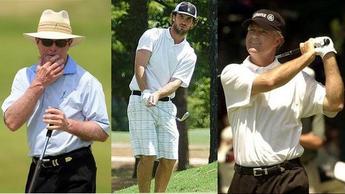 I love amateur golf: everyone is friendly and encouraging, the banter is great when someone in the group hits a good shot, and playing partners talk to each other all day. Amateurs will dwell on how close they came to playing well last round just to convince their playing partners how good they are. Leading up to Q School, Donald Constable sounded a lot like those guys. During U.S. Amateur qualifying, he explained to his playing partner how he had made a few late-round bogeys at the previous week’s Western Amateur to narrowly miss the match play, almost like that was a cool thing. This is common language for most average golfers, a defense against the close calls and disappointments you’re bound to experience if you play this game. Thing is, a pro golfer can’t think like that; to have longevity in this game you have to be in love with yourself. This sounds weird, but when I first began caddying on the Champions Tour for Tom Kite — who is the embodiment of longevity — I thought his insanely positive attitude was insincere. I remember after my first day working for him, I went to dinner with 1993 U.S. Amateur Champion John Harris, who was also playing in the event that week. Harris and Kite are great friends but everyone is different on the grass. Harris asked me, “What is TK like on the golf course?” I said, “John, he is fake out there! Every shot he hits, he tells me how good it is in his squeaky little voice.” This was just Monday, though, and since they only play three-round tournaments on the Champions Tour, we had a long way to go before the gun went off on Friday. But play started Friday and sure enough, Kite missed a 10-foot putt by a foot to the right (sorry, TK) and immediately said, “Man oh man I hit a good putt there!” I had to catch myself a few times thinking he was joking — I have a dry sense of humor, too — but this was no joke. After two rounds of this, Kite hadn’t broken character and sat at 10-under par for the tournament, and I began to seriously reconsider my prior evaluation of him. I said to Harris, “This guy is Mr. Positive all the time and I will say it is not fake one bit.” Still, in the back of my mind I thought, “Well, maybe when the pressure is really on, on Sunday afternoon he will get a little crazy.” A good test came on Sunday’s first hole, when Kite turned to me and asked if it was an 8-iron or 9-iron to the front pin cut over the bunker. “It will fly a little farther out of this rough,” I said, as confidently as I could. “Hit the 9-iron.” The ball plugged under the lip of the front bunker, leading Kite to his first bogey of the week, but he was as unperturbed as ever. “Man, that was a good swing, and so close,” he said.We would have won the tournament that week but Fred Funk putted the best I have ever seen someone putt for three days and beat us. Still, I had learned a valuable lesson about how to approach the game mentally. Constable’s self talk was the first real change we made when we started preparing for Q School, and I think it’s been just as important as all of his short-game improvements. The first true test of this huge attitude change came after Constable’s close call at the U.S. Amateur– I knew that defeat could have been crushing if he let it be. I never heard him tell anyone about the fatal two-stroke penalty he charged himself, but when I heard him tell a close friend simply that he had played well down there and it was a great tournament, I knew he was going to play on the PGA Tour. Now when we get done with a round, Constable rattles off every great shot he hit that day: birdie, long drive or putt, it doesn’t matter. If you keep talking positively, you will start to believe it yourself, after a while.
1 Comment
|
Ernie Rosetop teaching professional and swing coach Archives
May 2013
Categories |
 RSS Feed
RSS Feed